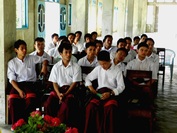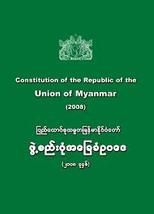 private school students, Toungoo
private school students, Toungoo While the government sends in its teachers, business people and healthcare providers to the conflict zones in ethnic areas, one has to remember that they do this without discussing with the ethnic 0rganizations such as KNU, KNPP, NMSP, etc. Sometimes, even without talking to civil society organizations that have been operating in the area for a long time. There was a total disregard of ethnic education systems, at times. On the one hand, it looks good that the government is trying to provide teachers for schools in Karen state; on the other hand, the real intent is to expand government’s reach and administration into conflict zone, because they did not take existing ethnic education system into consideration. So, the government's approach is a double-edged sword.
The government appears to be utilizing some of its initiatives in education sector as tools to expand their power and rule in Karen or KNU controlled area. The government in its own interest sees education as a tool of politics. But, if I am not wrong, most ethnic armed organizations don't look at education that way. Most of them think that they can negotiate political matters first, and then talk about economics, education and other matters later. The current government knows that this education reform is related to political reform. Without political reform, it won't be easy to make changes to or reform the education sector either. There are countries that reformed their education while going through their political reform. But in Burma, it is not a negotiated reform initiative. It is a one-sided reform. The government is trying to initiate a limited reform on its own term under their tight control, without consultation from the people or grassroots community, or the opposition. Even for education sector, it is important to have a negotiated, participatory reform process. Before making decision on direction of reform, the government needs to discuss with all stakeholders, take suggestion from ethnic nationalities, and pay attention to people’s needs.
It appears now that the Ministry of Education and its international partners are conducting their education sector review without proper consultation with ethnic education entities. They don't seem to know how many schools, teachers and students ethnic education entities have in their areas. It seems they are coming to the ethnic groups and ask for their participation only after they have decided on the direction they will take. I have made this statement in my interview with Karen Teachers' Working Group (KTWG): "We do not want the government to give us their options. We want to come up with possible options together in a participatory process. It means we want to participate in discussion and negotiate with the government to determine options that are available to us. It is fundamentally flawed if they come to give us with options we have after they talked about these issues on their own. We do not want to be given their options; we want to decide it on our own and come up with options for ourselves. We want to negotiate with the government on these options. Only then the reform process will be supported by the people and good for the entire country and all ethnicities."
Posted by: Saw Kapi
The government appears to be utilizing some of its initiatives in education sector as tools to expand their power and rule in Karen or KNU controlled area. The government in its own interest sees education as a tool of politics. But, if I am not wrong, most ethnic armed organizations don't look at education that way. Most of them think that they can negotiate political matters first, and then talk about economics, education and other matters later. The current government knows that this education reform is related to political reform. Without political reform, it won't be easy to make changes to or reform the education sector either. There are countries that reformed their education while going through their political reform. But in Burma, it is not a negotiated reform initiative. It is a one-sided reform. The government is trying to initiate a limited reform on its own term under their tight control, without consultation from the people or grassroots community, or the opposition. Even for education sector, it is important to have a negotiated, participatory reform process. Before making decision on direction of reform, the government needs to discuss with all stakeholders, take suggestion from ethnic nationalities, and pay attention to people’s needs.
It appears now that the Ministry of Education and its international partners are conducting their education sector review without proper consultation with ethnic education entities. They don't seem to know how many schools, teachers and students ethnic education entities have in their areas. It seems they are coming to the ethnic groups and ask for their participation only after they have decided on the direction they will take. I have made this statement in my interview with Karen Teachers' Working Group (KTWG): "We do not want the government to give us their options. We want to come up with possible options together in a participatory process. It means we want to participate in discussion and negotiate with the government to determine options that are available to us. It is fundamentally flawed if they come to give us with options we have after they talked about these issues on their own. We do not want to be given their options; we want to decide it on our own and come up with options for ourselves. We want to negotiate with the government on these options. Only then the reform process will be supported by the people and good for the entire country and all ethnicities."
Posted by: Saw Kapi



 RSS Feed
RSS Feed

